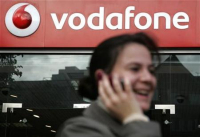 Vodafone's win in the $2.2 billion tax battle is not only good news for the world's largest mobile phone operator, but will also calm the jittery nerves of foreign investors, notes Faisal Kidwai.
Vodafone's win in the $2.2 billion tax battle is not only good news for the world's largest mobile phone operator, but will also calm the jittery nerves of foreign investors, notes Faisal Kidwai.
Supreme Court ruling on Friday against the $2.2 billion tax on
Vodafone has been welcomed by analysts.
They say the decision not only makes it easier for the company to launch an initial public offering, but also goes a long way in calming the fears of foreign investors.
Robin Bienenstock, an analyst at Sanford C Bernstein in London, told
Rediff.com: "I think Vodafone viewed a favourable ruling and certainly closure of the matter as a pre-requisite for an IPO."
Another analyst says the ruling is good news, especially from the global perspective.
Romal Shetty, executive director, telecommunications division, KPMG's Indian unit, says: "The decision has got multiple ramifications. Firstly, it was a very large amount and, obviously, it would have had a significant impact on Vodafone's operations in India. So, it's a big relief for them. The company can now focus on running the operations and serving customers rather than fighting tax battles in the court.
"Secondly, from a global perspective, it will have a positive impact on foreign investors, many of whom were questioning the India model and whether investing in India was profitable."
The country's economy and reputation have recently taken a battering as growth slowed down, reforms took a backseat and corruption scandal's gripped the nation.
Shetty says this ruling will be a shot in the arm for the industry, which has been plagued with bad news.
Vodafone was slapped with the tax bill after it acquired Hutchison Whampoa's India's mobile business for $11 billion in 2007.
The United Kingdom-based company said in its appeal that the Indian government had no authority to tax two foreign companies.
Government, on the other hand, claimed the tax was justified because most of the company's assets were in India and Vodafone had to withhold capital gains tax liabilities and pay them to the authorities.
The Supreme Court dismissed the government claim and ordered it to give back Vodafone $496 million it had deposited. It also told the authorities to pay Vodafone four per cent interest on the funds.
After the decision, Vodafone Chief Executive Vittorio Colao said: "We are a committed long-term investor in India. We will continue to grow our Indian business - including making significant investments in rural areas and in 3G network coverage."
Vodafone says it has plans for an IPO, but hasn't announced the date.
Bienenstock says there is still more that needs to happen before an IPO, in particular resolution of 3G roaming.
"It is hard to see how the current position on roaming is legal or fair or sensible in relation to the 3G licences that were purchased," she says.
Bienenstock says the Indian government should make the roaming regulations more linear and transparent.
"Indian telecom regulation seems determined to replicate Indian trains. Dividing limited spectrum amongst many operators is like requiring many operators to build the London Underground or New York City subway one-fifth size down one tunnel. You end up with five subscale networks that cannot take traffic.
"India would benefit from either much more spectrum (unlikely given current uses) or concentration of more spectrum in fewer hands and allowing roaming agreements.
"As the auctions are over, a more flexible law on consolidation of the telecom market would be the best way to get there."
Shetty agrees that India needs clarity in regulations.
"India is a very attractive market but, yes, we cannot have 12-13 operators. We need five or six. I think five or six operators can make money simply because there are a number of things that are still untapped."
He says the government has proposed a National Telecom Policy 2011 that has mergers and acquisitions and exit norms, but what are these exit norms and how will it allow companies to get out of India if they want to? Then there is the question of how spectrum would be managed in the future, the pricing and whether it would be auctioned.
So, it's a question of clarity, says Shetty.
He says hopefully the 2G case would be disposed off fast, one way or the other.
"As long as a decision is made and they are disposed off quickly, it will be fine. India is a very attractive market, but the sector has too many problems."
Bienenstock says the Supreme Court's decision could also help other companies.
"It could increase the range of possible solutions for Telenor's Uninor, which is too small to be successful, but clearly does not want to leave the market," she says.
Shetty says the ruling could benefit AT&T, which has a somewhat similar transaction like Vodafone.
He says even if the government changes provisions that would make transactions like Vodafone liable for tax they would not be retrospectively.
